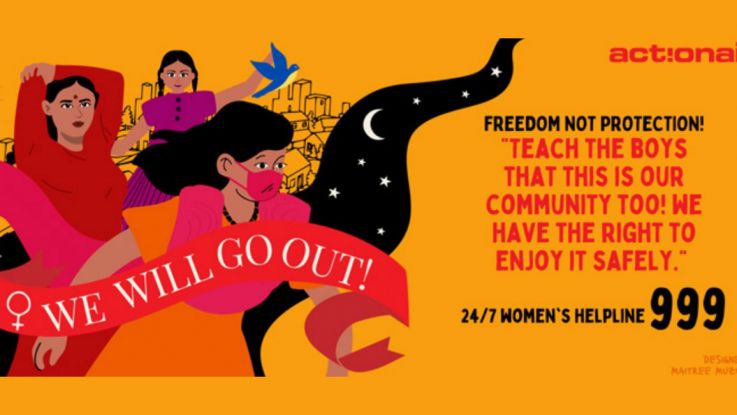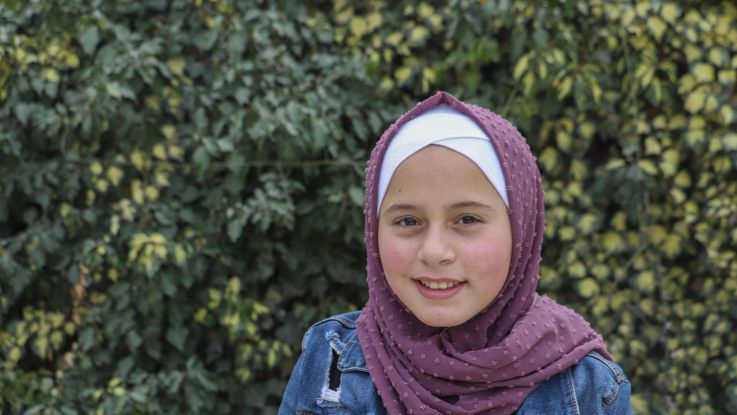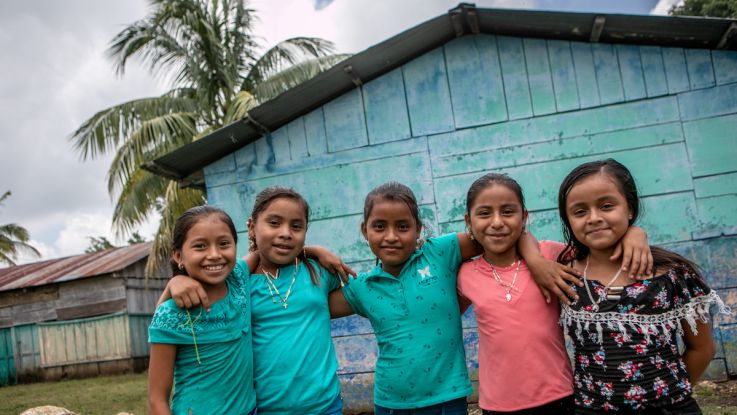Three ways to help girls stay in school
23 October 2018
From a safe house helping girls escape FGM, to Girls’ Rooms that provide a safe space for girls to manage their periods, helping girls to stay in school is at the heart of our work. Thank you to the players of People’s Postcode Lottery who have helped to make this vital work possible.
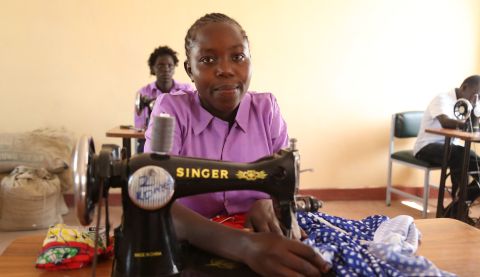
A donation from you can help girls to stay in school and choose the life they want to lead. Photo: Kevin Majoni/ActionAid
Around the world, as many as 263 million children are out of school, and twice as many girls as boys will never even start school.
But we know the transformation that happens - to whole communities - when girls start and stay in school. It reduces rates of child marriage and early pregnancy, promotes healthier families, improves wages and jobs for women, and empowers women to become leaders at community and government levels.
That’s why helping girls stay in school is a vital part of ActionAid’s work and, thanks to the support of the players of People’s Postcode Lottery, we’ve been able to help inspiring women and girls like Betty, Joyce, Janvier and Kellia.
1. Working with communities to abandon FGM
19-year-old Betty, pictured above, was able to escape female genital mutilation (FGM) in January 2018 with the support of the Komesi Women’s Network in partnership with ActionAid. She was one of 70 girls who has been given refuge and support by the Network in Kenya.
Before she came for help, she was arranged to be married at aged 18. In her community, girls don't usually start school; those who do are usually withdrawn between ages 9-12, so they can undergo FGM and be married off to an older man.
The Komesi Women’s Network, a community-based group in West Pokot County, is now training Betty to learn skills like tailoring, wood carving and bead-making. She hopes to become a professional tailor and open up her own shop one day.
“I was to be married off and actually if not for Komesi Women’s Network I would have been someone’s wife right now,” Betty says.
“Both boys and girls are equal and therefore there is no reason to deny a girl her rights to education. By denying her these rights, you increase her chances of living a life full of poverty in future.”
Working to eradicate the practice of FGM
Joyce is one of the founding members of the Komesi Women’s Network, which was formed in 2013 with the aim of eradicating the practice of FGM, and changing the mindsets of communities in West Pokot county.
ActionAid helped support and train Network members, who then pass knowledge on to the community. Previously, members of the Network took in and fostered girls who were at risk of FGM and child marriage, providing them with a home, food and education. Joyce is a foster mother to five girls.
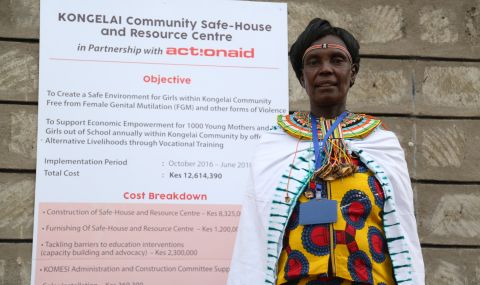
Joyce is one of the founding members of the Komesi Women’s Network . Photo: Kevin Majoni/ActionAid
The Network have now constructed a safe house where girls can go during school holidays, when they are most at risk of being taken for FGM and early marriage by their parents and relatives. There are currently over 80 girls in this safe house.
While the Network is fighting to keep girls in education, they also encourage girls who have missed school to stay hopeful, and provide them with vocation skills that will help them earn an income in the future.
Joyce says: “It [missing education] is not the end of life. With this facility now, and the trainings received, these girls can make it in life.”
2. Give mums and young children access to children’s centres
Janvier is a pre-school teacher at an ActionAid-supported Early Childhood Development (ECD) Centre in Nyanza, Rwanda.
She teaches Nursery 1 (mostly four-year-olds) through games, songs, dancing and play. Subjects include ‘Social and Emotional’, where children learn how to interact with each other, and ‘Discover the World’, where children learn about plants, animals and how to take care of their surroundings.
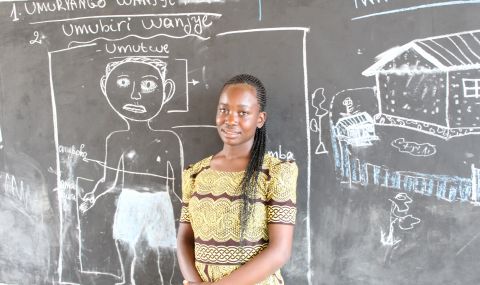
21-year-old Janvier is an early years teacher. Photo: ActionAid
Janvier says some of the children who come to the centre will arrive hungry, but get porridge in the morning which helps them learn. Health workers visit to do health checks, give vaccinations and monitor the children’s nutritional status to prevent malnutrition.
Working here is 21-year-old Janvier’s first job, and she said she enjoys teaching the children, and they are happy too.
“There were some children who cried at first when they were left at the (pre)school,” she says, “But now they are so happy. Some children cry at the weekend because they don’t get to come to school - their parents ring me and say they want to come to school!”
The ECD centre doesn’t just help children get a good start in life; it helps mums go to work and provide for their families, where before they might have struggled to find somewhere safe to leave them. Often mums would have to bring their young children to work.
Now, mums know they have somewhere safe and nurturing to leave their children, where they can play, learn and get a healthy start in life.
3. Help girls manage their periods with dignity
In Nyanza, Rwanda, managing their periods can be an insurmountable barrier for girls being able to attend school regularly.
Stigma and shame can cause girls to miss school or drop out altogether. This might because the schools lack water and a clean, safe space for girls to manage their periods hygienically and with dignity. They may be afraid or embarrassed to ask the teacher to go to the bathroom, they may be bullied by other school children, including boys, or they simply might not have access to sanitary products, which means that they cannot leave their homes.
That’s why ActionAid supports the provision of private, welcoming Girls’ Rooms where they can wash, access sanitary protection and learn about health and hygiene, to help them manage their periods with dignity and control.
At a school in Nyanza with an ActionAid-supported Girls’ Room, teachers say girls previously would have been absent while on their periods, because of shame and embarassment.
Now, girls are now are no longer missing classes. They can simply ask for the key and access the Girls’ Room, no questions asked. They can wash, get free sanitary materials and lie down if they’re in pain. They are given support to manage their periods, and can come for advice – not just on periods, but on sex, relationships, violence, abuse and HIV/Aids.
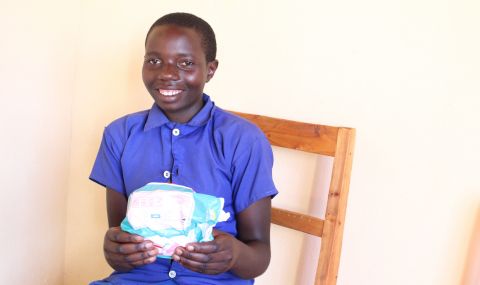
Kellia, 15, wants to be a secondary school teacher when she grows up. Photo: ActionAid
15-year-old Kellia is a student at the school, and is pleased for the support the Girls’ Room provide
“I think every school should have a Girls’ Room,” she says. “I want to advocate for others who don’t have them – because it has been so helpful for us”.
How you can help girls to stay in school
Thanks to the support of the players of People’s Postcode Lottery, our work is helping to give girls a healthier start in life, and break down the barriers that stop them staying in education.
The impact of this support will be far-reaching and transformative - empowering women, strengthening families and improving jobs and wages into the future.
If you’d like to support our work helping girls to stay in school, please make a donation to ActionAid today.
Read next
-
How has patriarchy affected girlhood?
9 October 2023
-
Back to school: How the earthquakes are disrupting education for Syrian girls
8 September 2023
-
Five ways to celebrate Day of the Girl this year
4 October 2022


